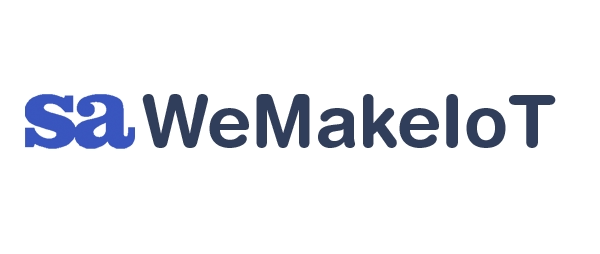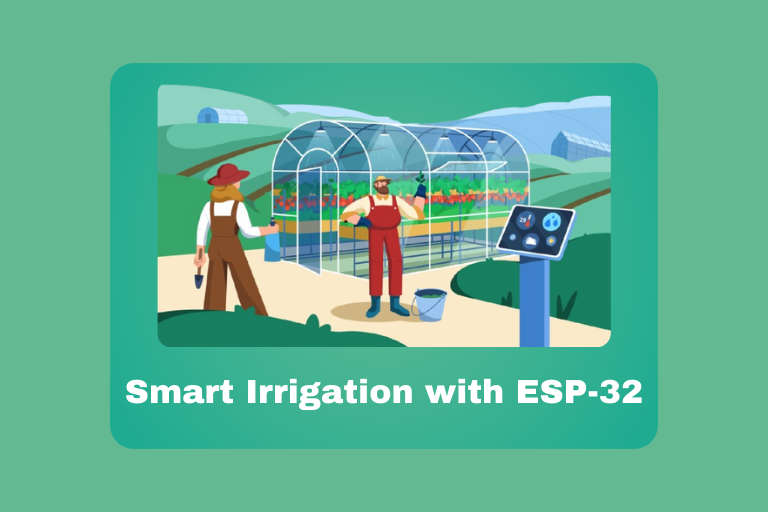As the demand for efficient and sustainable farming practices grows, technology has stepped in to transform agriculture. One such innovation is the Smart Irrigation Controller System, a solution designed to automate and optimize irrigation processes, reduce water waste, and boost productivity. At the core of this intelligent system lies the versatile ESP32 microcontroller, a powerful and energy-efficient IoT solution that makes smart farming both cost-effective and easy to implement.
The ESP32 is central to the system’s ability to collect and process data from environmental sensors, determine optimal watering requirements, and control various greenhouse equipment. This microcontroller has built-in Wi-Fi and Bluetooth capabilities, making it an ideal choice for remote monitoring and control.
Key functions of the Smart Irrigation Controller powered by ESP32 include:
- Automatic Watering Based on Real-Time Data
Sensors distributed across the greenhouse monitor environmental factors such as soil moisture, temperature, and humidity. The ESP32 collects this data, analyzes it, and determines the exact amount of water needed to keep plants healthy without wasting resources. It automates the irrigation process, ensuring plants are watered only when necessary, reducing water consumption. - Remote Monitoring and Control
The system offers a user-friendly web interface that allows farmers to monitor and control irrigation from anywhere. Through this interface, the user can view real-time sensor data, track the status of pumps and equipment, and even adjust irrigation schedules remotely. The web interface is directly powered by the ESP32’s web server capabilities, allowing seamless integration. - Greenhouse Equipment Control
Aside from managing irrigation, the system can also control other greenhouse equipment such as pumps, lights, windows, and heaters. This ensures optimal growth conditions are maintained in an automated manner. The ESP32 manages these devices through GPIO pins, relay modules, or RS485 communication, offering flexible connectivity options. - Three Configuration Modes
Farmers can choose from three operational modes to manage the system:- Schedule Mode: Set specific times for irrigation based on predefined schedules.
- Interval Mode: Program the system to irrigate at fixed intervals, regardless of environmental conditions.
- Condition-Based Mode: This is the most efficient mode, where irrigation happens only when the system detects that soil moisture or temperature levels are outside desired thresholds.
- Data Logging and Analysis
All sensor readings, irrigation actions, and environmental changes are logged online for long-term tracking and analysis. The data is stored on cloud servers and can be accessed anytime through the web interface. This log history helps farmers make informed decisions by comparing environmental conditions with crop productivity, adjusting irrigation strategies accordingly.
The ESP32 microcontroller brings several advantages to this system:
- Low Power Consumption: Perfect for battery-powered or solar-based deployments in agricultural fields.
- Dual Core Processing: Ensures the system can handle real-time sensor data while managing web communication and greenhouse equipment without delays.
- Wireless Connectivity: ESP32’s Wi-Fi and Bluetooth capabilities make it easy to integrate into existing networks, enabling seamless control from smartphones, laptops, or remote servers.
- Cost Efficiency: Compared to other microcontrollers, ESP32 offers a powerful feature set at an affordable price, making IoT-based farming solutions more accessible.
Benefits for Farmers
- Water Conservation: By automating irrigation based on real-time soil and environmental conditions, the system helps farmers save significant amounts of water, particularly in regions with scarce water resources.
- Improved Productivity: With precise control over environmental conditions, plants grow healthier and more efficiently, leading to better yields.
- Remote Management: The ability to monitor and control irrigation and greenhouse equipment from anywhere frees farmers from constant on-site supervision, improving work-life balance and efficiency.
- Data-Driven Decisions: The system’s data logging capabilities provide insights that allow farmers to fine-tune their irrigation strategies over time, leading to improved crop performance.
The integration of ESP32 into Smart Irrigation Controller Systems marks a significant step toward smarter and more sustainable agriculture. With its powerful processing capabilities, low energy consumption, and seamless connectivity, the ESP32 is the perfect backbone for an automated farming solution that boosts productivity while conserving resources. As more farms adopt IoT solutions like this, the future of farming looks greener, more efficient, and data-driven.
Contact us for consultations, support, or customized solutions tailored to your needs.




